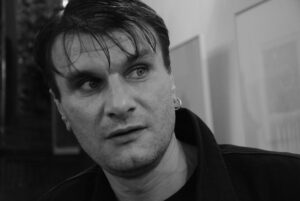Rimvydas Stankevičius

Photo by Vladas Braziūnas
Rimvydas Stankevičius (b. 1973) is a poet, essayist and song lyric writer. He obtained a Master’s degree in Lithuanian literature at Vilnius University. His debut collection of poems, Akis (The Eye), was published in 1996. He went on to publish eight poetry books, a series of short stories, two collections of essays, and a rhyming fairy tale for children. In 2002, together with the composer Rokas Radzevičius, Stankevičius created the rock opera Jūratė ir Kastytis (Jūratė and Kastytis). His poetry has won prestigious awards and has been translated into Polish, Swedish, Finnish, English and other languages.
Because of the ultimate exaltation of poetry and the poet, Stankevičius’s poems are attributed to the so-called poet-centric style. The origins of poet-centricism lie in the romantic understanding of art as a “higher truth”. The poet obtains the role of a medium, a suffering prophet. Stankevičius’s most famous work is his poetic trilogy: Laužiu antspaudą (Breaking the Stamp, 2008), Patys paprasčiausi burtažodžiai (The Most Simple Spells, 2010) and Ryšys su vadaviete (The Connection with the Command Post, 2012). According to the author, inspiration struck one night and dictated the structure of the trilogy, but each book was written as if it was a stand–alone piece because, while writing each book, he didn’t yet hold the key to the next one. The trilogy as a whole is characterised by metaphysical questions of faith, the afterlife, and a desire to solve divine secrets, to look at the dark side of humanity lurking in the shadows, and in the poet’s own words, to force oneself into “the musty underarm between life and death”.
Stankevičius’s latest collection of poems, Kiaurai kūnus (Through the Bodies, 2020), is characteristically poet-centric as well. According to the poet, the collection was inspired by a conversation with an older writer, Donaldas Kajokas, who had claimed that poetry was something you had heard before, but not from another person. In his poems, Stankevičius attempts to record precisely the things which the external world and eternity are saying.
Selected translations
German: Die allereinfachsten Zaubersprüche. Translated by Cornelius Hell. Klagenfurt: Wieser Verlag, 2017
Translations on-line: www.lyrikline.org/en/authors/rimvydas-stankevicius